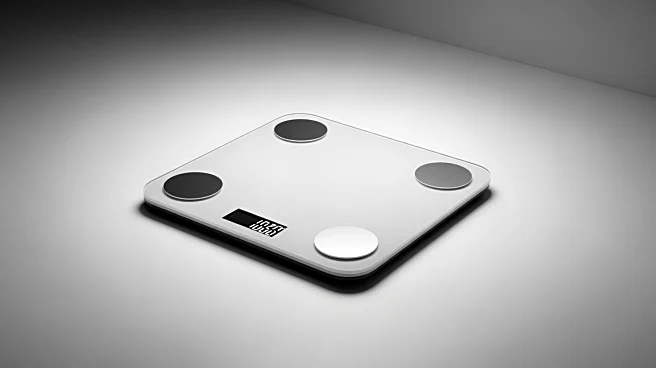What's Happening?
Smart scales are increasingly popular for individuals seeking to monitor their weight and body composition. These devices offer more data than traditional analog scales, including estimations of body fat, total body water, and heart rate. However, experts
like Stella Lucia Volpe, a professor at Virginia Tech, caution that smart scales may not provide the same level of accuracy as dual-energy X-ray absorptiometry (DXA) scans, which are considered the 'gold standard' for assessing bone mineral density and body composition. Users are advised to weigh themselves consistently, ideally in the morning and on an even surface, to ensure more reliable readings. Despite their limitations, smart scales can still offer valuable insights for those without access to more advanced measurement tools.
Why It's Important?
The rise of smart scales reflects a growing interest in personal health and fitness technology. These devices provide users with a convenient way to track health metrics, which can be particularly useful for those managing weight loss or fitness goals. However, the potential inaccuracies of smart scales highlight the need for users to understand the limitations of consumer-grade health technology. While smart scales can guide users in tracking trends over time, they should not be relied upon for precise medical assessments. This underscores the importance of combining technology with professional health advice for comprehensive health management.
What's Next?
As technology advances, smart scales may become more accurate and offer additional features. Manufacturers might focus on improving the precision of these devices to better compete with professional-grade equipment. Meanwhile, consumers are likely to continue integrating smart scales into their health routines, using them alongside other fitness and health technologies. The ongoing development of health apps and wearable devices could further enhance the functionality and appeal of smart scales, making them a staple in personal health management.
Beyond the Headlines
The use of smart scales raises questions about data privacy and the ethical implications of health monitoring technology. As these devices collect sensitive health information, ensuring the security and confidentiality of user data is crucial. Additionally, the reliance on technology for health insights may lead to overemphasis on numerical data, potentially affecting users' mental health and body image perceptions. Balancing technological convenience with mindful health practices will be essential as these devices become more integrated into daily life.
















